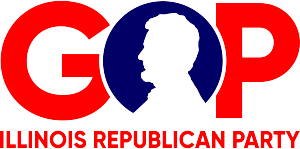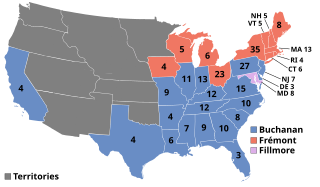
The Illinois General Assembly (IGA) is the bicameral legislature of the U.S. state of Illinois and comprises the Illinois House of Representatives and the Illinois Senate. The General Assembly was created by the first state constitution adopted in 1818. The State Senate has 59 members while the House has 118 members, all elected from single-member districts. A Senate district is formed by combining two adjacent House districts. The current General Assembly is Illinois's 100th. The General Assembly meets in the Illinois State Capitol in Springfield, Illinois. Its session laws are generally adopted by majority vote in both houses, and upon gaining the assent of the Governor of Illinois. They are published in the official Laws of Illinois.

The Illinois House of Representatives is the lower house of the Illinois General Assembly, the bicameral legislature of the U.S. state of Illinois. The body was created by the first Illinois Constitution adopted in 1818. The House consists of 118 representatives elected from individual legislative districts for two-year terms with no limits; redistricted every 10 years, based on the 2010 U.S. census each representative represents approximately 108,734 people.

The Illinois Senate is the upper chamber of the Illinois General Assembly, the legislative branch of the government of the State of Illinois in the United States. The body was created by the first state constitution adopted in 1818. The Illinois Senate is made up of 59 senators elected from individual legislative districts determined by population; redistricted every 10 years, based on the 2010 U.S. census each senator represents approximately 217,468 people. Under the Illinois Constitution of 1970, senators are divided into three groups, each group having a two-year term at a different part of the decade between censuses, with the rest of the decade being taken up by two four-year terms. This ensures that the Senate reflects changes made when the General Assembly redistricts itself after each census.

The United States Senate elections of 1940 coincided with the election of Franklin D. Roosevelt to his third term as President.
The Democratic Party of Illinois is the affiliate of the U.S. Democratic Party in the U.S. state of Illinois. It is the oldest extant state party in Illinois and, along Republican Parties, one of just two recognized parties in the state.

Elections to the United States House of Representatives for the 27th Congress were held at various dates in different states from July 1840 to November 1841.

The Illinois Republican Party is the state-level affiliate of the Republican Party in Illinois. Since May 17, 2014, it has been chaired by Tim Schneider. The party is one of two legally established, statewide political parties in Illinois, the other being the Democratic Party.

The 2008 United States elections were held on November 4. The result was a significant victory for the Democratic Party on the national level, as they increased majorities in both houses of Congress and won the Presidency. Democratic Senator Barack Obama of Illinois defeated Republican Senator John McCain of Arizona in the presidential election. Riding Obama's coattails, the Democrats also picked up net gains of 8 Senate seats and 21 House seats.

The Treasurer of Illinois is an elected official of the U.S. state of Illinois. The office was created by the Constitution of Illinois.
Illinois is a Democratic stronghold in presidential elections and one of the three largest Democratic states in the nation alongside California and New York. It is one of the most Democratic states in the nation with all state executive offices and both state legislative branches held by Democrats. For most of its history, Illinois was widely considered to be a swing state, voting for the winner of all but two presidential elections in the 20th century. Political party strength in Illinois is highly dependent upon Cook County, and the state's reputation as a blue state rests upon the fact that the majority of its population and political power is concentrated in Chicago, Cook County, and the Chicago metropolitan area. Outside of Chicago, the suburban collar counties continue trending Democratic while downstate Illinois can be considered more conservative with some moderate regions.

The 2014 United States House of Representatives elections in Illinois were held on Tuesday, November 4, 2014 to elect the 18 U.S. Representatives from the state of Illinois, one from each of the state's 18 congressional districts. The elections coincided with the elections of other federal and state offices, including Governor of Illinois and United States Senate.

The 2012 Elections for the Illinois House of Representatives was conducted on Tuesday, November 6, 2012. State Representatives are elected for two-year terms, with the entire House of Representatives up for a vote every two years. The share of votes remained very similar from the last election, but the Democrats were able to win back several seats, due in part to their near complete control of the state's redistricting process after the 2010 census, allowing them to win 3/5 of the seats in the House of Representatives.

The 1856 United States elections elected the members of the 35th United States Congress. The election took place during a major national debate over slavery, with the issue of "Bleeding Kansas" taking center stage. Along with the 1854 election, this election saw the start of the Third Party System, as the Republican Party absorbed the Northern anti-slavery representatives who had been elected in 1854 under the "Opposition Party" ticket as the second most powerful party in Congress. Minnesota and Oregon joined the union before the next election, and elected their respective Congressional delegations to the 35th Congress.

The 1852 United States elections elected the members of the 33rd United States Congress. The election marked the end of the Second Party System, as the Whig Party ceased to function as a national party following this election. Democrats won the presidency and retained control of both houses of Congress.

The 1885 United States Senate election in Illinois was held from February 18 to May 19, 1885. The contentious election was determined by a joint session of the Illinois General Assembly. Incumbent Republican United States Senator John A. Logan, seeking a third term in the United States Senate, was unanimously nominated by a Republican caucus. However, some assemblymen expressed concern about the candidate and abstained from supporting him.
Carol Ammons is a Democratic member of the Illinois House of Representatives who has represented the 103rd district since January 2015. The 103rd district covers the heart of the Champaign–Urbana metropolitan area, including most of Champaign and Urbana. She is the first African American woman to serve in the seat, and the first from Champaign County to be elected beyond the County Board level.

The 2016 United States House of Representatives elections in Illinois were held on November 8, 2016, to elect the 18 U.S. Representatives from the state of Illinois, one from each of the state's 18 congressional districts. The elections coincided with the 2016 U.S. presidential election, as well as other elections to the House of Representatives, elections to the United States Senate and various state and local elections.

The 2020 United States elections will be held on Tuesday, November 3, 2020. All 435 seats in the United States House of Representatives, 34 of the 100 seats in the United States Senate, and the office of President of the United States will be contested. Thirteen state and territorial governorships, as well as numerous other state and local elections, will also be contested.

The 2016 Elections for the Illinois House of Representatives were conducted on Tuesday, November 8, 2016. State Representatives are elected for two-year terms, with the entire House of Representatives elected every two years. The Democratic party lost a net of four seats and thus its three-fifths supermajority in the chamber. Republicans picked up five seats in the 63rd, 71st (Sterling), 76th (LaSalle), 79th (Kankakee), and 117th (Marion) districts, whilst the Democrats won the previously Republican held 112th district (Edwardsville/Collinsville)

The 2020 United States House of Representatives elections in Illinois will be held on November 3, 2020, to elect the 18 U.S. Representatives from the state of Illinois, one from each of the state's 18 congressional districts. The elections will coincide with the 2020 U.S. presidential election, as well as other elections to the House of Representatives, elections to the United States Senate and various state and local elections.












